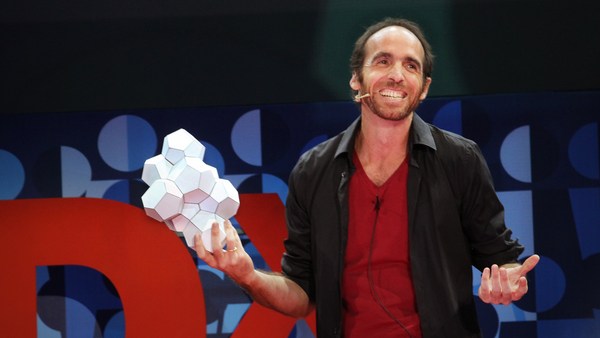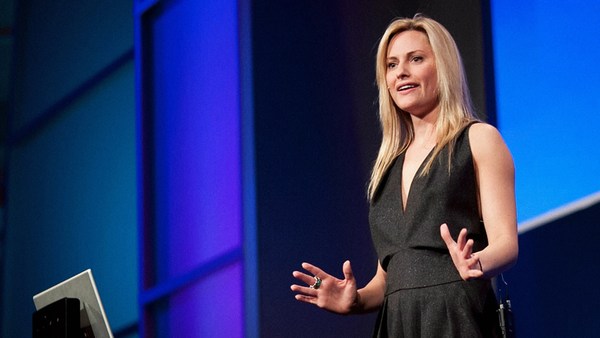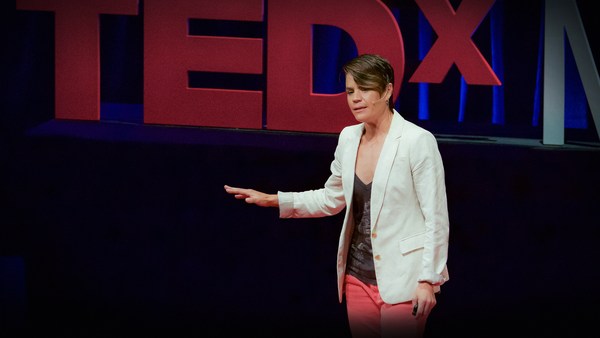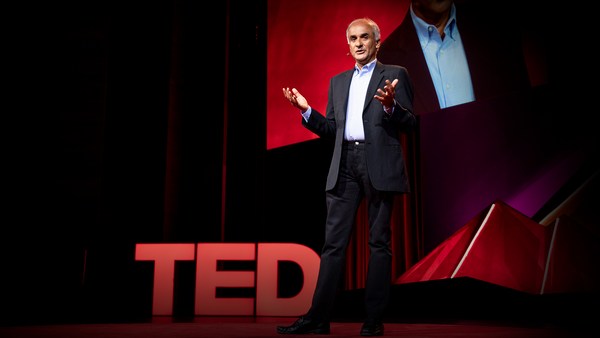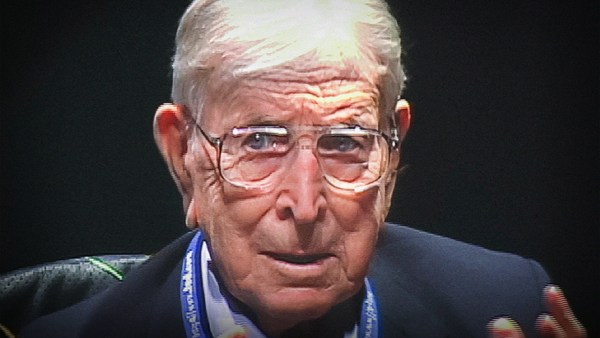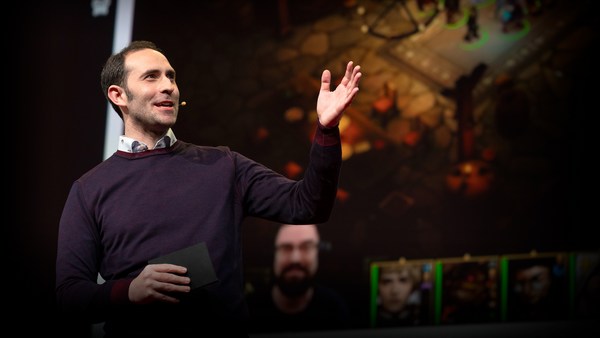I opened a blind man's head. I didn't make him think or reflect -- I cracked his head open, literally. We were walking with him holding onto my shoulder, I miscalculated how much space there was between us, and I knocked him into a gate.
(Laughter)
Five stitches in his forehead. At that moment, I felt like the worst teacher in the world. I really didn't know how to apologize. Luckily, El Pulga is one of those people who takes things quite well. And to this day, he says that I was the coach who left the most important mark on his career.
(Laughter)
The truth is, when I started working at the institute for the blind, I was surprised by a lot of things. A lot of the things they did, I never imagined they could: they swam, did exercise, played cards. They drank mate, and could pour it without burning themselves in the process.
But when I saw them playing soccer -- that was amazing. They had a dirt field, rusty goalposts and broken nets. The blind who attended the institute would play their games there, just like I did at a field near my house. But they played without being able to see. The ball made a sound so they could locate it. They had a guide behind the rival team's goal to know where to kick the ball. And they used eye masks. There were guys who could still see a little, and they wore eye masks so everyone was equal.
When I was more at ease with them, I asked for a mask myself. I put it on and tried to play. I had played soccer all my life. This is where it got even more amazing: within two seconds, I didn't know where I was standing. I had studied physical education because I loved high performance.
I started working at the institute by chance. My other job was with the Argentinian National Rowing Team, and I felt that was my thing. Here, everything was twice as hard. I'll never forget the first day I did the warm-up with the team. I lined them up in front of me -- I used to do that with the rowing team -- and I said, "OK, everyone bend down," going like this. When I looked up, two guys were seated, three were lying down and others were squatting.
(Laughter)
How could I do here the same things I was doing there? It took me a while. I started looking for tools to learn from them, from the teachers who worked with them. I learned I couldn't explain a play on a chalkboard like a coach does, but I could use a plastic tray and some bottle caps so they could follow me by way of touch. I also learned they could run on a track if I ran with them, holding a rope. So we started looking for volunteers to help us run with them.
I was enjoying it, and finding purpose and meaning in what we were doing. It was hard at first, it was uncomfortable, but I decided to overcome the discomfort. And there came a time when it became the most fascinating job I'd ever had.
I think that's when I wondered: Why couldn't we be a high-performance team as well? Of course, one thing was missing: I needed to find out what they wanted, the real protagonists of this story. Three hours of training, playing soccer on that field, were not going to be enough. We would have to train differently.
We started to train harder, and the results were great; they asked for more. I came to understand that they, too, wondered why they couldn't do high-performance. When we felt ready, we knocked at CENARD's door. CENARD is the National Center for High-Performance Sports here in Argentina. It was hard to get them to hear what we had to say. But it was considerably more difficult to get the other athletes training there to consider us their equals. In fact, they would let us use the field only when no other teams were using it. And we were known as "the blind ones." Not everyone knew exactly what we were doing there.
The 2006 World Championship was a turning point in the team's history. It was held in Buenos Aires for the first time. It was our chance to show everyone what we had been doing all that time. We made it to the finals. We were growing as a team.
It was us against Brazil in the finals. They were the best team in the tournament. They won every game by a landslide. Hardly anyone believed we could win that game. Hardly anyone -- except for us.
During pre-game meetings, in the locker room, during each warm-up, it smelled of victory. I swear that smell exists. I smelled it several times with the team, but I remember it in particular, the day before we played that final. The Argentine Football Association had opened their doors to us.
We were training at AFA, where Verón, Higuain and Messi trained. For the first time ever, we felt like a true national team. At 7:30pm, the day before the game, we were in the lounge discussing strategy, and a waiter knocks on the door, interrupting our conversation. He suggested we go to church. He came to invite us to church. I tried to get rid of him, saying it wasn't a good time, that we better leave it for another day. He kept insisting, asking me to please let him take the guys to church, because that day, a pastor who performed miracles would be there.
I was slightly afraid to ask what type of miracles he meant, and he replied nonchalantly, "Coach, let me take the team to the church, and when we return, I guarantee that half of them will be able to see."
(Laughter)
Some of the guys laughed, but imagine being a blind person and someone says that to you. I didn't know what to say. I said nothing; it was an awkward silence. I didn't want to make him feel bad, because he truly believed this could happen.
One of the players saved me, when he stood up and confidently said, "Juan," -- that was the kid's name -- Gonza already told you it's not the best time to go to church. Besides, let me make this clear: if we go to that church, and I end up being able to see when we return, I will beat you so hard if I can't play tomorrow."
(Laughter)
(Applause)
Juan left, laughing in resignation, and we continued with our pregame talk. That night when I went to sleep, I began to dream about the next day's game, imagining what could happen, how we would play. And that's when I noticed that smell of victory I mentioned a while ago. And it's because at that moment, I thought: if the other players had the same desire as Diego going into the game, it was impossible for us not to win.
The next day was going to be wonderful. We got up at 9am, the game was at 7pm, and we were already eager to play. We left AFA, and the bus was full of flags that people had given to us. We were talking about the game, and we could hear people honking and cheering, "Go Murciélagos! Today's the day! The final challenge!"
The guys asked me, "Do they know us? Do they know we're playing?" Some people followed the bus to CENARD. We arrived and found an amazing scene. In the corridor leading from the locker room to the game field, I was walking with Silvio, who was holding onto my shoulder, so I could guide him. Fortunately, there were no gates along the way.
(Laughter)
When we reached the field, he asked me about everything. He didn't want to miss a single detail. He said, "Tell me what you see, tell me who's playing the drums."
I tried to explain what was happening with as much detail as possible. I told him, "The stands are packed, a lot of people couldn't get in, there are blue and white balloons all over the field, they're opening a giant Argentine flag that covers the entire grandstand."
Suddenly, he cuts me off and says, "Do you see a flag that says 'San Pedro'?" That's the city where he lives. I started looking into the stands and I spotted a little white flag with lettering done in black spray paint, that read: "Silvio, your family and all of San Pedro are here."
I told him that and he replied, "That's my mom, tell me where she is, I want to I wave at her." I pointed him toward the flag and showed him with his arm where they were sitting, and he waved his arms in that direction. About 20 or 30 people stood up and gave him an ovation. When that happened, I saw how his face changed, how moved he was. It was moving for me, too; two seconds later, I had a lump in my throat. It was strange -- I felt both the excitement of what was happening, and the anger and the anguish that he could not see it.
A few days later when I told him what I had experienced, he tried to reassure me, saying, "Gonza, don't feel bad, I could see them. Differently, but I swear to you that I saw them all."
The game started. We could not fail; it was the final. The audience was quiet, like here, because in soccer for the blind, the public has to be quiet so the players can hear the ball. They're only allowed to cheer when the game is over.
And when there were eight minutes to go, the crowd did all the cheering they hadn't done in the first 32 minutes. When pigeon-toed Silvio nailed the ball at an angle, they cheered with all their heart, in an incredible way.
Today, if you go to CENARD, you'll see a huge poster on the door, with a photo of our team, Los Murciélagos. They're a model national team, everyone in CENARD knows who they are, and after having won two World Championships and two Paralympic medals, no one doubts they are high-performance athletes.
(Applause)
(Applause ends)
I was lucky to train this team for 10 years, first as a trainer and later as their coach. I feel that they've given me much more than what I've given them.
Last year, they asked me to coach another national team, Power Soccer. It's a national team of young men who play soccer in wheelchairs. They use motorized wheelchairs that they drive with a joystick, because they don't have enough strength in their arms to use conventional chairs. They added a bumper to the chair, a safeguard that protects their feet, while allowing them to kick the ball. It's the first time that, instead of being the spectators, they're now the main characters. It's the first time their parents, friends and siblings can see them play.
For me, it's a new challenge, with the same discomfort, insecurity, and fear I had when I started working with the blind. But I approach it all from a more experienced position. That's why from day one, I treat them as athletes on the field, and off the field, I try to put myself in their shoes and behave without prejudice, because treating them naturally feels best to them.
Both teams play soccer; something once unthinkable for them. They had to adapt the rules to do so. And both teams broke the same rule -- the one that said they couldn't play soccer.
When you see them play, you see competition, not disability. The problem starts when the game is over, and they leave the field. Then they step in to play our game, in a society whose rules don't really take them into account or care for them.
I learned from sports that disability greatly depends on the rules of the game. I believe that if we change some of the rules of our game, we can make life a little easier for them.
We all know there are people with disabilities; we see them daily. But by having no direct contact with them, we're not aware of the problems they face every day, like how hard it is for them to get on a bus, find a job, take the subway or cross the street.
It's true that there is an increasing social responsibility regarding the inclusion of people with disabilities. But I think it's still not enough. I think change needs to come from every one of us. First, by leaving behind our indifference toward the disabled, and then by respecting the rules that do take them into account. They are few, but they do exist.
I cracked a blind man's head open -- El Pulga's head. I can assure you these two teams opened mine as well. They taught me that above all, you have to get out there and play every game in this beautiful tournament that we call life.
Thank you.
(Applause)
